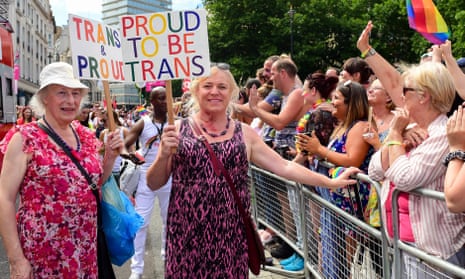On Sunday, the Church of England’s governing body, the General Synod, voted by an overwhelming majority not simply to welcome but also to affirm transgender people. The world now feels a better place. Casting doubt on their lived experience is well known to be harmful to trans people, who often have to assert the reality of their gender identity when those around them are perplexed by or hostile to what they are saying. The Church of England’s apparent uncertainty about trans people had contributed to this.
Hitherto, the Church of England appeared to be in two minds about trans people, and even now not all members of the church are convinced. Contrary to the international multi-disciplinary standards of care, some Christians think that trans people’s minds should be altered to match their bodies. This is why the Church of England’s decisive vote is so significant. It signals that this church, as an institution, is ready to align itself with the evidence base that endorses trans people’s reality and their right to self-determination. It is of a piece with its decision the previous day to align itself with the professional bodies that consider gay conversion therapy to be harmful.
The synod debate on trans people was not so much about science and theology, though these were part of it. The most powerful speeches in the debate were those that included the stories of Christian transgender people and their families. Trans people are not a group of “others” out there, but are already actively involved in the life of the Church of England. We may be a minority, but many of us, clergy and laity, contribute to the life and mission of the church in quite ordinary, unremarkable ways. We love God and we love the church, even though some of us have been hurt by it.
My own journey, as someone who transitioned in 2001, having been ordained for more than 20 years, illustrates the church’s ambivalence at that time. Being transgender was not a barrier to ordination in the Church of England, though much still depended on one’s bishop, as Church of England bishops have a degree of autonomy in their dioceses. The church’s view of trans clergy at the time was perhaps less significant than its attitude to women. My bishop, who did not ordain women, wanted me to surrender the permission he had given me to practise as a hospital chaplain. In the end it was easier to move to a chaplaincy post in another diocese, where the bishop was cautious to begin with, but provided excellent pastoral care and, eventually, affirmation.
On the other hand, my theological college contemporary, the late Rev Carol Stone, who transitioned as a parish priest in 2000, was fully supported by her bishop, who did ordain women. At the same time, people were offering themselves for ordination who had transitioned earlier in their lives, and the Church of England put provisions in place that enabled them to enter the discernment process.

The Church of England’s then-implacable opposition to same-sex marriage, and its initial reservations about civil partnerships, also had unfortunate consequences for trans people who were heterosexually married. The Gender Recognition Act 2004 stipulated that they could obtain full gender recognition only by first divorcing their spouse and then, if they wished, contracting a civil partnership. It was odd to find the church’s position apparently encouraging divorce.
At the time of my transition, I was in a long-term partnership with the man who is now my husband. Since the Gender Recognition Act, trans people legally confirmed in their gender identity under its provisions are able to marry someone of the opposite sex in their parish church. If clergy are aware of someone’s gender journey, and have conscientious objections to such a marriage, they are not obliged to conduct the ceremony. Nevertheless, the Church of England did not object to the Gender Recognition Act in the way it did to the Marriage (Same Sex Couples) Act 2013, under which it has extensive exemptions.
Does this mean the Church of England finds it easier to accept trans people than lesbian or gay people? Possibly, though it has sometimes been less than comfortable with either group. But given the tone of recent General Synod debates, it now seems prepared to listen, learn and change. Trans people who transition, as I did, seem to fit the male/female binary the church tends to insist on. Non-binary people appear to question that distinction, but were mentioned in Sunday’s debate, which was said to signal hope for all gender-variant people.
The Church of England is still very conflicted about homosexuality but has just set up several groups to map the way ahead. The next step for the bishops is to consider introducing liturgies to mark transgender people’s journeys. Trans people must be part of that conversation.
